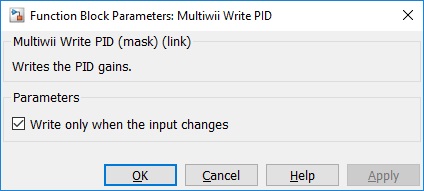

Multiwii Write PID
Writes PID gains to the auto-pilot.
Library
QUARC Targets/Communications/Multiwii MATLAB Command Line Click to copy the following command line to the clipboard. Then paste it in the MATLAB Command Window: qc_open_library('quarc_library/Communications/Multiwii')
Description

The Multiwii Write PID block uses the Multiwii protocol on the input stream to send a command to the aircraft to
write PID gains to the auto-pilot. The Multiwii Write PID block sends a MSP_SET_PID
message to the auto-pilot.
This block is designed to be used with blocking I/O. It is typically used with a stream connected to a serial port. To open the stream a Multiwii Connect block should be used.
The inputs of the block are the proportional, integral and derivative gains for the auto-pilot controllers. Each of the inputs is a vector containing the gains. The n-th element of the proportional, integral and derivative gains corresponds to the n-th controller. The input vectors must be the same length. The standard order for the controllers is:
| Element | Controller |
|---|---|
| 1 | ROLL |
| 2 | PITCH |
| 3 | YAW |
| 4 | ALT |
| 5 | POS |
| 6 | POSR |
| 7 | NAVR |
| 8 | LEVEL |
| 9 | RMAG |
| 10 | VEL (currently unused) |
A copy of the stream is also output so that the Multiwii blocks may be chained together.
If an error occurs, then the block returns a negative error code at its err output. The Compare to Error block may be used to check for specific error codes. If the stream is not valid because it is not yet connected, the err output will be zero since this condition is expected and the validity of the stream may be checked using the con output of the Multiwii Connect block.
Helpful Hints
Other uses of this block
 Although it is intended for use in the main diagram with the other Multiwii
blocks, the
Multiwii Write PID
block may be used
with the Advanced stream blocks, even in an asynchronous thread.
Although it is intended for use in the main diagram with the other Multiwii
blocks, the
Multiwii Write PID
block may be used
with the Advanced stream blocks, even in an asynchronous thread.
Input Ports
stm
A reference to the stream created by the Multiwii Connect block. If a connection has not yet been established, then the err output of the Multiwii Write PID block will be zero.
p
An integer vector (uint8) of the proportional gains.
i
An integer vector (uint8) of the integral gains.
d
An integer vector (uint8) of the derivative gains.
Output Ports
stm
A reference to the stream. This output is merely a copy of the stm input. Providing this output makes it much easier to establish the execution order of Multiwii blocks in the diagram because Simulink generally executes daisy-chained blocks in sequence.
err
An int32 value indicating whether the message was sent successfully. This value will be positive if message was sent successfully. It will be zero if no message was sent. If an error occurs then this value is a negative error code. See Error Codes for the different error codes and their values. Use the Compare to Error block rather than the error code itself to check for specific error codes. To check for errors in general use the Compare to Zero block to check whether the err output is less than zero.
Parameters and Dialog Box

Write only when the input changes
Check this option to have the block only write new PID gains when the input changes. If this option is not checked then the block will write new PID gains every time it executes.
This option makes it easier to use the block, since it typically makes a Triggered Subsystem MATLAB Command Line Click to copy the following command line to the clipboard. Then paste it in the MATLAB Command Window: doc('simulink/triggeredsubsystem') unnecessary when the option is checked.
Targets
|
Target Name |
Compatible* |
Model Referencing |
Comments |
|---|---|---|---|
|
Yes |
Yes |
||
|
Yes |
Yes |
||
|
Yes |
Yes |
||
|
Yes |
Yes |
||
|
Yes |
Yes |
||
|
Yes |
Yes |
||
|
Yes |
Yes |
||
|
Yes |
Yes |
||
|
Yes |
Yes |
||
|
Yes |
Yes |
||
|
Yes |
Yes |
||
|
Yes |
Yes |
||
|
Yes |
Yes |
||
|
Yes |
Yes |
Last fully supported in QUARC 2018. |
|
|
Rapid Simulation (RSIM) Target |
Yes |
Yes |
|
|
S-Function Target |
No |
N/A |
Old technology. Use model referencing instead. |
|
Normal simulation |
Yes |
Yes |
See Also

Copyright ©2025 Quanser Inc. This page was generated 2025-11-01. Submit feedback to Quanser about this page.
Link to this page.